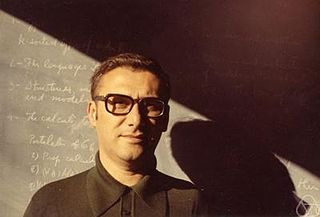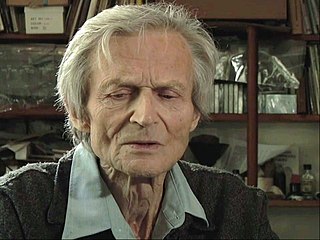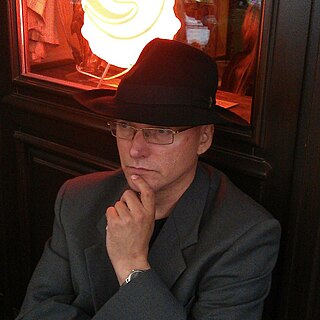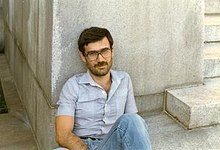In logic, a three-valued logic is any of several many-valued logic systems in which there are three truth values indicating true, false, and some third value. This is contrasted with the more commonly known bivalent logics which provide only for true and false.
Paraconsistent logic is an attempt at a logical system to deal with contradictions in a discriminating way. Alternatively, paraconsistent logic is the subfield of logic that is concerned with studying and developing "inconsistency-tolerant" systems of logic, which reject the principle of explosion.
In classical logic, intuitionistic logic and similar logical systems, the principle of explosion, or the principle of Pseudo-Scotus, is the law according to which any statement can be proven from a contradiction. That is, from a contradiction, any proposition can be inferred; this is known as deductive explosion.
Categorical logic is the branch of mathematics in which tools and concepts from category theory are applied to the study of mathematical logic. It is also notable for its connections to theoretical computer science. In broad terms, categorical logic represents both syntax and semantics by a category, and an interpretation by a functor. The categorical framework provides a rich conceptual background for logical and type-theoretic constructions. The subject has been recognisable in these terms since around 1970.

Newton Carneiro Affonso da Costa was a Brazilian mathematician, logician, and philosopher. Born in Curitiba, he studied engineering and mathematics at the Federal University of Paraná in Curitiba and the title of his 1961 Ph.D. dissertation was Topological spaces and continuous functions.
Non-classical logics are formal systems that differ in a significant way from standard logical systems such as propositional and predicate logic. There are several ways in which this is commonly the case, including by way of extensions, deviations, and variations. The aim of these departures is to make it possible to construct different models of logical consequence and logical truth.

Graham Priest is a philosopher and logician who is Distinguished Professor of Philosophy at the CUNY Graduate Center, as well as a regular visitor at the University of Melbourne, where he was Boyce Gibson Professor of Philosophy and also at the University of St Andrews.

Jean-Yves Beziau (French:[bezjo]; born January 15, 1965, in Orléans, France is a Swiss Professor in logic at the University of Brazil, Rio de Janeiro, and Researcher of the Brazilian Research Council. He is permanent member and former president of the Brazilian Academy of Philosophy. Before going to Brazil, he was Professor of the Swiss National Science Foundation at the University of Neuchâtel in Switzerland and researcher at Stanford University working with Patrick Suppes.
Dov M. Gabbay is an Israeli logician. He is Augustus De Morgan Professor Emeritus of Logic at the Group of Logic, Language and Computation, Department of Computer Science, King's College London.

Stanisław Jaśkowski was a Polish logician who made important contributions to proof theory and formal semantics. He was a student of Jan Łukasiewicz and a member of the Lwów–Warsaw School of Logic. He is regarded as one of the founders of natural deduction, which he discovered independently of Gerhard Gentzen in the 1930s. He is also known for his research into paraconsistent logic. Upon his death, his name was added to the Genius Wall of Fame. He was the President (rector) of the Nicolaus Copernicus University in Toruń.

Trivialism is the logical theory that all statements are true and that all contradictions of the form "p and not p" are true. In accordance with this, a trivialist is a person who believes everything is true.
In mathematics and philosophy, Łukasiewicz logic is a non-classical, many-valued logic. It was originally defined in the early 20th century by Jan Łukasiewicz as a three-valued modal logic; it was later generalized to n-valued as well as infinitely-many-valued (ℵ0-valued) variants, both propositional and first order. The ℵ0-valued version was published in 1930 by Łukasiewicz and Alfred Tarski; consequently it is sometimes called the Łukasiewicz–Tarski logic. It belongs to the classes of t-norm fuzzy logics and substructural logics.

Andrzej Grzegorczyk was a Polish logician, mathematician, philosopher, and ethicist noted for his work in computability, mathematical logic and the foundations of mathematics.
Dialogical logic was conceived as a pragmatic approach to the semantics of logic that resorts to concepts of game theory such as "winning a play" and that of "winning strategy".

Ruy J. Guerra B. de Queiroz is an associate professor at Universidade Federal de Pernambuco and holds significant works in the research fields of Mathematical logic, proof theory, foundations of mathematics and philosophy of mathematics. He is the founder of the Workshop on Logic, Language, Information and Computation (WoLLIC), which has been organised annually since 1994, typically in June or July.
Formal scientists have attempted to combine formal logic and dialectic through formalisation of dialectic. These attempts include pre-formal and partially formal treatises on argument and dialectic, systems based on defeasible reasoning, and systems based on game semantics and dialogical logic.
The following is a list of works by philosopher Graham Priest.

Frode Alfson Bjørdal is philosophy professor emeritus at the University of Oslo, Norway.
Maria Cristina De Sales Viana Serôdio Sernadas is a Portuguese mathematical logician whose research topics have included object-oriented specification languages and logics for information systems, and the use of category theory in the combination ("fibring") of multiple types of logic. She is Professor for Logic and Computation in the Department of Mathematics of the Technical University of Lisbon.








